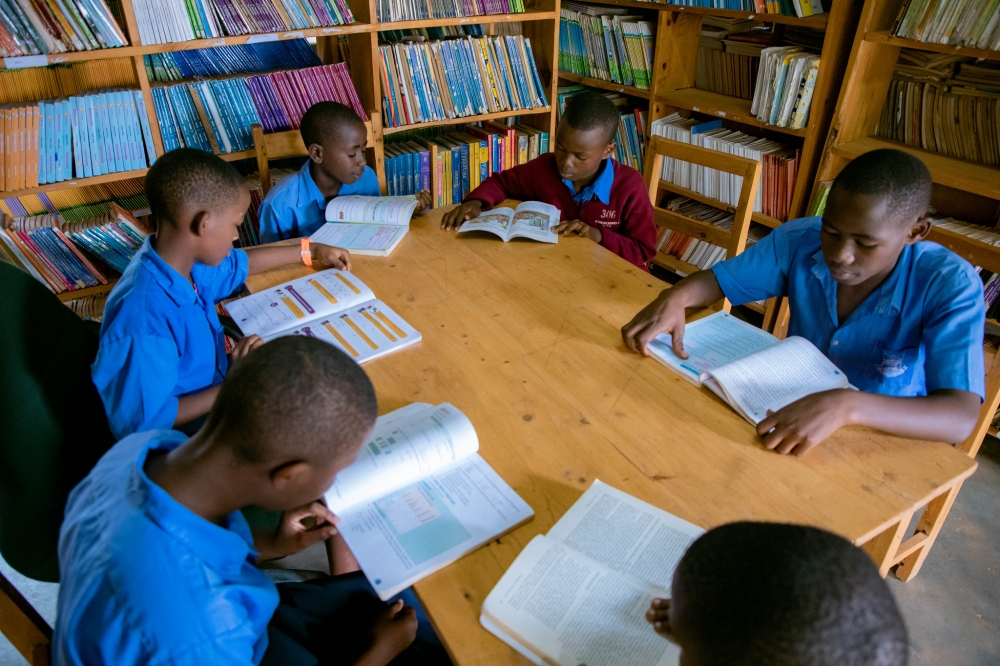

John Rusimbi began his writing journey in the late 1980s as a young man, starting with poetry and later transitioning to writing novels.
Now serving as the president of the Pan African Writers Association (PAWA) — an umbrella body of writers associations on the African continent and the diaspora— Rusimbi started writing while in exile in Uganda. He returned to Rwanda immediately after the 1994 Genocide against the Tutsi and lived in Nyamata where he acquired his first job as the headmaster of Nyamata High School.
Rusimbi’s inspiration was sparked while in exile as a victim of discrimination and degradation. Upon his return, he encountered the immediate aftermath of the Genocide, with churches filled with human skulls and survivors struggling to find meaningful livelihoods.
Filled with thoughts and ideas, he compiled stories about lived experiences, including exile, genocide, and reconstruction efforts, inspired by Rwanda’s intricate past.
ALSO READ: Declining reading culture: What role can parents, guardians play to boost reading?
Rusimbi has published four novels and several poems with different publishing companies, including JANUS Publishing Company Limited in London.
Rwanda’s reading culture
According to Rusimbi, the reading culture in the country is "still low”.
"Nonetheless, there has been a tremendous improvement in the last five to ten years as the institutions responsible for culture and education have accumulated several community libraries stocked with Rwandan-authored books which have bolstered the children and youth to visit and read,” he said.


Rusimbi highlighted the need for an improved internal market like the public purchase of Rwandan-authored books to be used in the national curriculum.
He is optimistic that this would encourage young people to consume local literature instead of "depending on Western books with all their adverse influence on our culture.”
Looking back 10 years, the number of Rwandan writers has grown, particularly those focused on children’s books in Kinyarwanda, Swahili, English, and French, Rusimbi noted.
Mutesi Gasana, an author and the founder of Ubuntu Publishers Ltd and Arise Education, has also observed the progress in Rwanda’s reading culture.
"Starting my very first bookshop in 2012 when people mistook the bookshop for a stationery shop, I have seen tremendous changes within the whole book supply chain — it has evolved over the years, for example, the government’s efforts, international community interventions, and community engagements have transpired the role of publishers and booksellers in the spotlight,” Gasana stated.
ALSO READ: Literary enthusiasts on promoting reading culture in schools
She mentioned that evolution has enhanced parents’ involvement and passion for books, leading to a greater appreciation of the importance of purchasing books for their children.
For Gasana, opening a bookstore was a dream born from a passion for providing accessible, affordable, and diverse books to the Rwandan community.
Arise Education faced various challenges when it first started as a bookshop, as customers initially sought more stationery than books. However, over the years, this has changed as people now realise they can also buy books at the shop, she noted.
Barbara Umuhoza, the author of "Shaped”, said Rwandans have what it takes to boost the reading culture, however, "we ought to be intentional in how we cultivate this.”
"A simple example would be starting a reading and writing competition in schools, awarding the best performers, and other initiatives like that. Rwandans are readers if you inform them that the material or information to read is available,” she said.
The best way to cultivate a strong reading habit is at home — by reading to a child even before they are born, continuing as they grow through the various stages of their development. This helps establish a family culture centred on reading and writing from a young age.
Richard Hategekimana has authored 12 books, such as ‘The Revolutionary Hero Paul Kagame’, ‘The Strong Friendship Pact with the Youth’, ‘The Strong Friendship Pact with RPF-Inkotanyi’, ‘The Africa We Want’, and others. He expressed his joy at the growth of the reading and writing culture in the country.
"When you visit different libraries and bookshops, you realise that Rwandans have adopted an interest in reading books although more effort is required to stimulate this culture.”
Challenges
Umuhoza mentioned that Rwandans have numerous stories to share but face challenges in the publishing process. For those who manage to publish, marketing their books proves to be a tough and costly endeavour.
"In the end, so many books never see the light of day, and those that make it, never get to be known by readers. We still have a long way to go but with the recent trend of new writers, social media influencing and the creative industry growing, I believe that this will change,” she noted.
Hategekimana said that local authors are investing time, talent, and resources to publish their craft, but buyers are still few. "We should instil a change of mind-set to boost reading.”
He emphasised the importance of regulating a book policy, a legal document that governs all book operations—this policy may assist investors in funding the sector.
According to Rusimbi, despite the presence of local publishing houses, there is a lack of professional editors to enhance the quality of local writers’ work. Moreover, the marketing efforts have not been very successful in generating income from their craft.
"Institutions responsible for culture and education respectively need to invest in the Rwandan book industry to improve the book value chain from the author to the publisher and bookseller,” Rusimbi said.
Boosting reading
The Pan African Writers Association (PAWA) is one of the organisations that have contributed to the promotion of literature within and outside the continent and has been in existence for the past 30 years.
One of PAWA’s milestone contributions is its collaboration with partners in the book industry to establish the UN SDG Book Club - African Chapter which unravels the ambitions of the Sustainable Development Goals through relatable stories that young children can be enthused by.
Mobile Library, a local initiative launched in 2019 by Rwanda Bookmobile, a local non-government organisation, supports children in the early primary levels across the county to enhance their reading skills. The initiative targets primary pupils by supplying books published in Kinyarwanda, French, and English.
Nabu.org is a free reading app that distributes children’s books in Rwanda and globally. It was initiated by NABU, a tech-enabled publisher of multilingual children’s books, to curb illiteracy and allow every child to read and rise to their full potential.
The e-library application contains a variety of books on shelves. A child can tap any book of their choice, download multiple books, and read them later without needing internet access.
A child can download even more than 200 books and be able to share the books with their friends who don’t have the application.
"We help community libraries and primary schools have access to Kinyarwanda storybooks which are usually not enough. All of the NABU books are freely available on the NABU app available on smartphones and tablets, and parents, caregivers, schools, and other literacy practitioners can download them,” said Philippe Nkwakuzi, the country manager of NABU Rwanda.
The company tracks the impact daily using data available on their dashboard where they see the number of books downloaded, average time spent on the application, and cumulative pages read.
More than one million people have downloaded the app with an average of 10,000 readers per day, an average of 11 minutes spent reading and over six million pages have been read up to current.
In a study "The Role of Public Library in Promoting the Reading Culture in Rwanda” published in June 2023, authored by Jean-Claude Kabagambe and Martin Elihaki Kanyika, findings indicate that the public library was being used mostly for reading.
Additionally, it revealed that most of the respondents spent more than one hour in the library reading. The findings also showed that most of the library users visit the library every week.
It indicated that the major factors that hinder library users from reading in the library include long distances to reach the public library, financial constraints, and addiction to television and other viewing gadgets.
The study concluded that the public library helps to promote the reading culture among users despite the factors that impede effective reading.
Researchers recommend that library management create multiple branches or mobile public libraries to reduce the need for users to travel long distances to access a public library.


